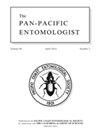墨西哥普埃布拉香菜中首次记录到稻根蚜Rhopalosiphum rufiadaminale(Sasaki,1899)(半翅目:蚜科)
IF 0.6
4区 农林科学
Q4 ENTOMOLOGY
引用次数: 0
摘要
芫荽或香菜,芫荽(茴香科),是一种在墨西哥菜中用作配料的植物。2017年,墨西哥向美国和加拿大出口了约6.4万吨,价值超过4700万美元(SIAP 2019)。今天,种植面积为6983公顷,其中普埃布拉州是最大的生产国,面积为3294公顷(SIAP 2021)。自2018年以来,技术人员报告说,香菜的根部和根部存在一种未知类型的蚜虫。2021年2月,在普埃布拉省Quecholac、Palmarito Tochapan采集到蚜虫(N18.924975°,W97.644956°)。若虫和成虫保存在70%的乙醇中。利用Blackman & Eastop(2006)和Peña-Martínez et al.(2017)的检索,鉴定该物种为水稻根蚜,Rhopalosiphum rufiabdominale (Sasaki, 1899)。水稻根蚜虫经常在禾科、苏科和蔷薇科的物种上发现(Blackman & Eastop 2006)。棉花(Doncaster 1956)、辣椒和气培南瓜(Etzel & Petit 1992)、西红柿和土豆(Blackman & Eastop 2000)、芹菜(Dara 2015)和大麻(cransshaw & Wainwright-Evans 2020)也有报道。Aldryhim & Khalil(1996)也报道了沙特阿拉伯的C. sativum根上存在rufiabdominale。该报告是墨西哥首次记录水稻根蚜对香菜作物的影响。收集到的个体颜色各不相同,从早期的橙色到无翅成年的深绿色(图1)。在这两种情况下,在角状体的高度都可以看到一个红色的区域。这种颜色的模式是区别于Rhopalosiphum maidis (Fitch, 1856),它是蓝绿色的,在角状体的底部有深色的斑点。然而,它们可能经常与Rhopalosiphum padi (Linnaeus, 1758)混淆,因为它们的角部呈红色,但R. padi有六个触角节,而R. rufiabdominale有五个触角节(Doncaster, 1956)。蚜虫的爆发会造成重大的经济损失。大量种群直接以作物为食会导致生长减少、发黄和叶片变形。一些被水稻根蚜侵染的植株表现出发黄和生长减少的现象(图1a)。然而,有些标本是从没有变黄的植物中采集的,而且显然是健康的。这种昆虫在普埃布拉州的最高发病率发生在12月至3月,此时降水较少。这种蚜虫的隐蔽习性使其很难被发现,如果没有及时发现最初的侵染,这可能导致高密度,严重影响作物。本说明的目的是告知墨西哥普埃布拉(Puebla)地区香菜上存在褐腹虫(R. rufiabdominale)的情况,以便种植者和田间技术人员能够及时采取措施,如在该害虫发展的最佳条件下进行频繁监测和管理备用寄主。此外,有必要提供关于替代工具的信息,使我们能够为控制这种有害生物提供合理的建议。本文章由计算机程序翻译,如有差异,请以英文原文为准。
First record of the rice root aphid, Rhopalosiphum rufiabdominale (Sasaki, 1899) (Hemiptera: Aphididae), in coriander in Puebla, Mexico
Coriander or cilantro, Coriandrum sativum L. (Apiaceae), is a plant used as an ingredient in dishes of Mexican cuisine. In 2017, Mexico exported around 64,000 tons to the United States and Canada, valued at more than US$47 million (SIAP 2019). Today, 6983 ha are cultivated, with Puebla being the largest producer with 3294 ha (SIAP 2021). Since 2018, technicians have reported the presence of an unknown type of aphid on the roots and base of cilantro. In February 2021, aphids were collected in Palmarito Tochapan, Quecholac, Puebla (N18.924975°, W97.644956°). The nymphs and adults were preserved in 70% ethyl alcohol. Using the keys of Blackman & Eastop (2006) and Peña-Martínez et al. (2017), the species was identified as the rice root aphid, Rhopalosiphum rufiabdominale (Sasaki, 1899). The rice root aphid is frequently found on species of Poaceae, Cyperaceae, and Rosaceae (Blackman & Eastop 2006). It has also been reported on cotton (Doncaster 1956), chili and aeroponic pumpkin (Etzel & Petit 1992), tomato and potato (Blackman & Eastop 2000), celery (Dara 2015), and hemp (Cranshaw & Wainwright-Evans 2020). Aldryhim & Khalil (1996) also reported the presence of R. rufiabdominale on C. sativum roots in Saudi Arabia. This report is the first record of the rice root aphid in Mexico affecting the cilantro crop. The collected individuals varied in coloring, ranging from orange in early instars to dark green in wingless adults (Fig. 1). In both cases, a reddish area was visible at the height of the cornicles. This pattern of coloring is distinguishable from Rhopalosiphum maidis (Fitch, 1856), which is bluish green and has dark spots at the base of the cornicles. However, they can be frequently confused with Rhopalosiphum padi (Linnaeus, 1758) because of the reddish coloring at the cornicles, but R. padi has six antennal segments, while R. rufiabdominale has five (Doncaster 1956). Aphid outbreaks can cause significant economic damage. Large populations feeding directly on the crop can cause a reduction in growth, yellowing, and leaf deformation. Some plants infested with rice root aphid exhibited yellowing and reduced growth (Fig. 1a). However, some of the specimens were collected from plants that were not yellowing and were apparently healthy. The highest incidence of this insect in Puebla occurs from December to March, when precipitation is low. The cryptic habit of this aphid makes its detection difficult, and if initial infestations are not detected on time, this can lead to high densities that seriously affect the crop. The purpose of this note is to inform of the presence of R. rufiabdominale on cilantro in Puebla, Mexico, so that growers and field technicians can take timely measures, such as frequent monitoring when there are optimal conditions for development of this pest and management of alternate hosts. In addition, it is necessary to generate information on alternative tools that would allow us to give sound advice for control of this pest.
求助全文
通过发布文献求助,成功后即可免费获取论文全文。
去求助
来源期刊

Pan-Pacific Entomologist
生物-昆虫学
CiteScore
0.50
自引率
20.00%
发文量
47
审稿时长
>12 weeks
期刊介绍:
The Pan-Pacific Entomologist (ISSN 0031-0603) is published quarterly (January, April, July and October) by the Pacific Coast Entomological Society, in cooperation with the California Academy of Sciences. The journal serves as a refereed publication outlet and accepts manuscripts on all aspects of the biosystematics of insects and closely related arthropods, especially articles dealing with their taxonomy, biology, behavior, ecology, life history, biogeography and distribution. Membership in the Pacific Coast Entomological Society includes subscription to The Pan-Pacific Entomologist, and Society Proceedings typically appear in the October issue of each volume.
 求助内容:
求助内容: 应助结果提醒方式:
应助结果提醒方式:


